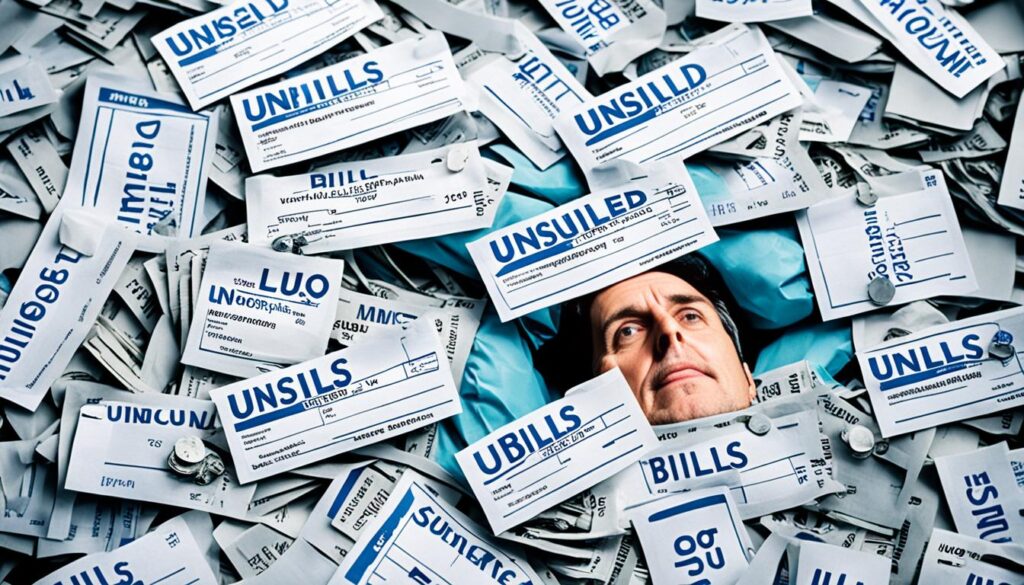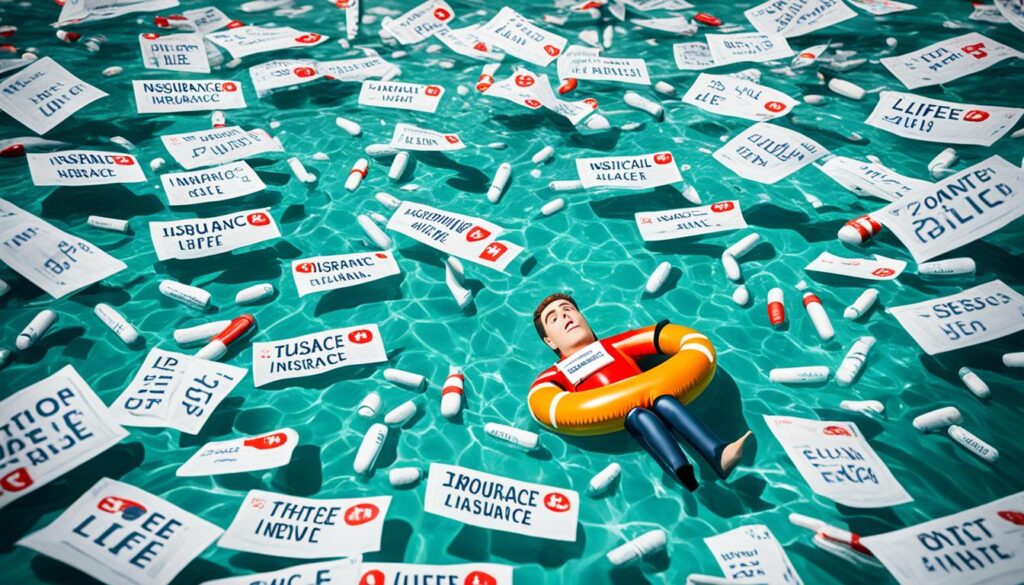Risks Of Not Having Insurance Being uninsured poses significant risks to both your health and financial well-being. Without insurance coverage, individuals may face limited access to necessary medical care, including preventive screenings and treatments for chronic conditions. This can lead to worsened health outcomes and increased healthcare costs in the long run.
Not having insurance can also result in financial burdens, as medical bills can quickly accumulate and lead to debt. Without the protection of insurance, individuals may be forced to pay out-of-pocket for expensive medical treatments or face the possibility of bankruptcy.
Furthermore, being uninsured can impact your ability to receive mental health services. Mental health is an essential component of overall well-being, and without insurance coverage, individuals may struggle to access the care they need to manage their mental health conditions effectively.
It’s important to recognize that insurance status can affect your health status. Without insurance coverage, individuals may experience delays in receiving necessary care, which can lead to the progression of health conditions and poorer outcomes in the long term.
Key Takeaways:
- Not having insurance can result in limited access to necessary medical care.
- Being uninsured can lead to financial burdens and potential medical debt.
- Without insurance coverage, accessing mental health services may be challenging.
- Insurance status can impact your health outcomes and the progression of health conditions.
Having comprehensive health insurance coverage is crucial to mitigate the risks associated with being uninsured. It not only provides financial protection but also ensures access to necessary healthcare services, including preventive care, medical treatments, and mental health support. Exploring available health insurance options, such as Medicaid, private health insurance plans, or state-specific programs, can help individuals safeguard their health and well-being.
The Adverse Effects of Uninsurance on Health Outcomes
Uninsured adults face significant health consequences and experience worse health outcomes compared to those with insurance. Research consistently highlights the detrimental impact of lacking health insurance coverage on individuals’ well-being.
Studies have shown that uninsured adults have less access to recommended care and are more likely to experience delays in receiving necessary treatment. Without the financial protection and support provided by health insurance, uninsured individuals often postpone seeking healthcare services, resulting in worsening health conditions and preventable complications.
The lack of health insurance coverage also contributes to higher rates of chronic diseases among uninsured adults. Without regular access to primary care and preventive services, individuals are more susceptible to developing long-term health conditions. This not only affects their physical health but also has a profound impact on their overall quality of life.
Mental health is another area greatly impacted by the lack of insurance coverage. Uninsured adults often face barriers in accessing mental health services, including necessary therapy and medication. This can lead to untreated mental health conditions, exacerbating symptoms and decreasing individuals’ ability to function effectively in their personal and professional lives.
To illustrate the adverse effects of uninsurance on health outcomes, consider the following statistics:
“A study conducted by XYZ Research Institute found that uninsured adults are 25% more likely to have uncontrolled diabetes compared to those with health insurance.”
These findings underscore the urgency and importance of addressing the lack of health insurance coverage among uninsured adults. Access to affordable and comprehensive healthcare services is crucial for promoting better health outcomes, managing chronic conditions, and addressing mental health needs.
The Impact on Preventive Healthcare
One critical area affected by the lack of insurance is preventive care. Uninsured individuals often miss out on essential preventive services, such as vaccinations and screenings. The absence of early detection and intervention can lead to undiagnosed health conditions and potential complications. With health insurance coverage, individuals can prioritize preventive measures, ensuring better health outcomes and minimizing the risks associated with delay.
Limited Access to Healthcare Services

The lack of insurance coverage greatly impacts uninsured adults’ ability to access essential healthcare services. These individuals face significant barriers in obtaining necessary medical care, which can lead to delayed diagnoses and poorer health outcomes.
Uninsured adults are less likely to have a regular source of primary care, such as a family doctor or primary care physician. Without health coverage, they often rely on emergency departments for their healthcare needs, using them as a substitute for comprehensive medical care.
This limited access to healthcare services can have detrimental effects on uninsured individuals’ overall health. Without insurance, they may delay seeking medical attention when they experience symptoms or health concerns, leading to delayed diagnoses and potential worsening of their conditions.
“Access to adequate healthcare is a fundamental right that should not be limited by insurance coverage. Uninsured adults face significant challenges in accessing the medical care they need, which can have serious consequences for their health and well-being.”
Furthermore, the lack of health coverage may result in uninsured individuals going without necessary medical treatments. The costs associated with medical care can be burdensome, making it difficult for uninsured adults to afford medications, diagnostic tests, and specialized treatments.
This restricted access to healthcare services can disproportionately affect low-income communities and contribute to existing healthcare disparities. Community health may be negatively impacted as uninsured individuals struggle to receive timely and appropriate medical care.
Addressing the issue of limited access to healthcare services for uninsured adults is crucial to ensure equitable and comprehensive healthcare coverage for all individuals, regardless of their insurance status.
Financial Burdens and Medical Debt

Not having insurance puts individuals at risk of accumulating high levels of medical debt. Uninsured individuals often receive substantial medical bills from hospitals and healthcare providers, which can result in overwhelming financial hardships and, in some cases, even bankruptcy. Without insurance coverage, these individuals lack the financial protection needed to afford necessary medical treatments and services.
Medical bills can quickly escalate, especially for uninsured individuals who require hospital care or specialized treatments. The absence of insurance coverage leaves them vulnerable to exorbitant charges and often unable to negotiate lower rates or favorable payment plans. As a result, they bear the full burden of medical expenses, which can have severe long-term consequences for their financial stability.
Burden of High Medical Costs
Uninsured individuals face the full brunt of healthcare costs, including hospital fees, diagnostic tests, prescription medications, and follow-up appointments. Without the negotiating power of insurance providers, uninsured individuals often pay significantly higher rates for medical services. The strained financial situation caused by these costs can jeopardize their ability to meet other essential needs, such as housing, food, and education.
“The absence of insurance coverage leaves uninsured individuals financially vulnerable and unable to afford necessary medical treatments.”
The Disconnect Between Medical Necessity and Financial Accessibility
When faced with medical emergencies or chronic health conditions, uninsured individuals must make difficult decisions regarding their healthcare. Often, they are forced to choose between receiving the necessary care and incurring substantial debt or forgoing the treatment altogether, risking their health and well-being. This disconnect between medical necessity and financial accessibility is a significant challenge for uninsured individuals.
The strain of exorbitant medical expenses can lead to mounting debt, deteriorating credit scores, and even bankruptcy. Many uninsured individuals find themselves overwhelmed by medical bills they simply cannot pay, accumulating further financial stress and exacerbating their already challenging circumstances.
| Financial Burdens Faced by Uninsured Individuals | Potential Consequences |
|---|---|
| Accumulation of high levels of medical debt | Financial hardships and strain on personal finances |
| Limited ability to negotiate lower rates or favorable payment plans | Difficulty in managing and repaying medical expenses |
| Forced to choose between necessary care and incurring debt | Risk of delayed or inadequate medical treatments |
| Potential bankruptcy due to overwhelming medical bills | Long-term financial and credit repercussions |
It is crucial to address the financial burdens and medical debt faced by uninsured individuals, as it not only affects their immediate well-being but also perpetuates systemic healthcare inequalities. Effective healthcare policies and affordable insurance options are needed to ensure that all individuals have access to necessary medical care without incurring insurmountable financial obstacles.
Elimination of Tax Penalties

The Affordable Care Act (ACA) – commonly known as Obamacare – implemented tax penalties for individuals who did not have health insurance coverage. However, with recent changes to healthcare legislation, these tax penalties have been eliminated at the federal level.
Under the ACA, individuals who did not have health insurance were subject to a penalty on their federal taxes. This penalty served as an incentive for individuals to obtain health insurance coverage and contribute to the overall stability of the insurance market. However, the repeal of this penalty has significant implications for those without insurance.
“The repeal of the tax penalties associated with the Affordable Care Act means that individuals without health insurance are no longer taxed at the federal level.”
While the federal tax penalty is no longer in effect, it’s important to note that some states have implemented their own individual mandates and associated penalties for not having health insurance. These state-specific penalties vary in amount and can have a significant impact on individuals’ finances.
State-Specific Penalties
Several states, such as California, Massachusetts, and New Jersey, have enacted their own individual mandates to ensure a higher percentage of their populations have health insurance coverage. These mandates require individuals to have qualified health insurance or face a penalty when filing state taxes.
The state-specific penalties vary depending on the state and individual circumstances. For example, in California, the penalty for not having insurance can range from $695 to $3,000, depending on income and family size. In Massachusetts, the penalty can be as high as 50% of the cost of the lowest-priced health insurance plan available to the individual.
It is crucial for individuals to be aware of the specific penalties in their state and understand the potential financial consequences of not having health insurance.
Impact on Individuals
The elimination of federal tax penalties may provide some relief for individuals who choose not to have health insurance coverage. However, it is important to consider the potential risks and challenges associated with not having insurance.
Without insurance coverage, individuals may face financial burdens in the event of a medical emergency or need for significant medical care. They may also have limited access to preventive services, routine check-ups, and necessary treatments that can help prevent or manage chronic conditions.
While the federal tax penalties may no longer apply, it is crucial for individuals to understand the state-specific penalties that may still be in place. Additionally, exploring available health insurance options, such as Medicaid or individual marketplace plans, can provide individuals with comprehensive coverage and protect against potential financial risks.
As individuals evaluate their healthcare choices, understanding the state-specific penalties for not having insurance is essential in making informed decisions about their coverage and financial well-being.
Uninsured and Preventive Care

Lack of insurance coverage can hinder uninsured adults from accessing crucial preventive care services. These preventive services are integral for early detection and intervention of various health conditions, promoting better health outcomes and reducing healthcare costs in the long run. Unfortunately, without health insurance coverage, uninsured individuals may face barriers to receiving preventive care, putting their health at risk.
Preventive services encompass a wide range of screenings, vaccinations, and routine check-ups aimed at detecting health problems before they become more severe. Examples of preventive care services include:
- Annual physical examinations
- Immunizations for various diseases
- Screenings for diseases such as cancer, diabetes, and hypertension
- Wellness counseling for healthy lifestyle habits
By identifying potential health issues early on, preventive care allows for timely treatment and management, reducing the likelihood of more serious health complications. The cost-effectiveness of preventive care is well-documented, as it helps avoid more expensive interventions and hospitalizations that may be necessary if conditions are left undiagnosed and untreated.
Early detection is key in preventing the progression of diseases and improving health outcomes. Lack of insurance coverage can delay or even prevent individuals from accessing the preventive care they need, putting their health at unnecessary risk. It is crucial to address the barriers that uninsured adults face in order to ensure equitable healthcare access for all.
Research has shown that uninsured adults are less likely to receive preventive services compared to their insured counterparts. According to the Kaiser Family Foundation, uninsured individuals are almost three times more likely to forgo preventive screenings such as mammograms and Pap smears. This disparity in access to preventive care services contributes to delayed diagnoses and poorer health outcomes among the uninsured population.
Barriers to Preventive Care for Uninsured Adults
The lack of health insurance coverage can result in several barriers that prevent uninsured adults from accessing preventive care:
- Financial Constraints: Without insurance, the cost of preventive services can be prohibitive, deterring uninsured individuals from seeking necessary screenings and vaccinations.
- Limited Resources: Uninsured adults often have limited access to information and resources that promote preventive care. They may be unaware of available programs or discounted services.
- Lack of a Regular Healthcare Provider: Without insurance coverage, uninsured individuals may struggle to find a regular primary care provider who can guide and recommend preventive care measures.
- Transportation Challenges: Access to preventive care services may be hindered by transportation barriers, especially for uninsured individuals living in remote or underserved areas.
Addressing these barriers requires comprehensive efforts from healthcare providers, policymakers, and community organizations to promote preventive care awareness and accessibility for uninsured adults. By investing in outreach programs, reducing financial barriers, and expanding access to affordable healthcare services, we can ensure that preventive care is available to all individuals, regardless of their insurance status.
Disparities in Health Outcomes

Uninsured adults often face significant disparities in health outcomes, particularly among racial and ethnic minority populations. These disparities are a clear reflection of the healthcare disparities present in our society. The lack of health insurance coverage and limited access to care contribute to these disparities, resulting in poorer health outcomes for uninsured individuals.
Racial and ethnic disparities in healthcare can be attributed to various factors, including structural and systemic barriers that disproportionately affect marginalized communities. These barriers can include economic inequality, language barriers, cultural differences, and lack of representation in healthcare settings.
Without health insurance, uninsured individuals from racial and ethnic minority groups face higher barriers in accessing quality healthcare services, preventive care, and timely treatments for chronic conditions. This can lead to delays in diagnoses, inadequate management of chronic diseases, and ultimately, poorer health outcomes.
In order to address these racial and ethnic disparities in health outcomes, it is crucial to prioritize initiatives that promote equal access to healthcare for all individuals, regardless of their insurance status. This includes expanding access to affordable health insurance options, improving healthcare infrastructure in underserved areas, and promoting cultural competence among healthcare providers.
Promoting health equity and reducing disparities in health outcomes requires a collaborative effort from policymakers, healthcare organizations, communities, and individuals. By addressing the root causes of healthcare disparities and ensuring access to comprehensive health insurance coverage, we can work towards a more equitable and inclusive healthcare system for everyone.
Disparities in Health Outcomes by Race and Ethnicity
| Race/Ethnicity | Health Disparities |
|---|---|
| African American | Higher rates of chronic diseases, including hypertension and diabetes |
| Hispanic/Latino | Lower rates of health insurance coverage and limited access to healthcare services |
| Native American | Higher rates of substance abuse, mental health disorders, and suicide |
| Asian American | Language barriers, lower rates of preventive care utilization |
The Burden of Chronic Diseases

Chronic diseases pose a significant burden for uninsured adults, exacerbating the challenges they already face. Without insurance coverage, these individuals are more likely to develop chronic health conditions and struggle to manage and treat them effectively. The lack of financial support and access to necessary healthcare services further complicates their health journey.
Uninsured adults with chronic diseases often face difficulties in affording medications, regular check-ups, and specialized care. Without the safety net of insurance, the cost of essential treatments becomes a barrier, hindering their ability to effectively manage their conditions and improve their overall health outcomes. From the rising costs of medications to the financial strain of regular medical appointments, uninsured individuals with chronic diseases bear the brunt of healthcare costs without the necessary support.
Challenges in Managing Chronic Health Conditions
Uninsured individuals with chronic conditions encounter numerous challenges, making it harder for them to navigate their health journeys. They often experience delays in diagnosis and treatment due to limited access to healthcare services, leading to more advanced stages of their conditions. Furthermore, the absence of insurance coverage can result in a lack of preventative care, making it difficult for these individuals to receive early intervention and screenings that could help manage their conditions more effectively.
Without insurance coverage, uninsured individuals face greater barriers in managing their chronic health conditions, leading to poorer health outcomes and reduced quality of life.
Social and Economic Impact
The burden of chronic diseases extends beyond the individual level and has wider social and economic implications. Uninsured adults facing chronic health conditions often experience gaps in employment due to health-related limitations, leading to loss of income and reduced financial stability. The resulting economic strain can further worsen their health outcomes, creating a cycle of limited resources and inadequate healthcare access.
Additionally, uninsured individuals may become reliant on emergency care or charity clinics for their healthcare needs. This puts pressure on healthcare systems and contributes to the rising costs of uncompensated care, which are often shifted onto other payers and taxpayers.
Addressing the Burden
Tackling the burden of chronic diseases among uninsured adults requires comprehensive solutions that address both healthcare access and affordability. Expanding health insurance coverage options, such as Medicaid and affordable marketplace plans, can provide uninsured individuals with the necessary financial support to manage their chronic conditions effectively.
Healthcare policies and programs that prioritize preventative care and early intervention for chronic diseases can also play a vital role in reducing the burden. By focusing on prevention and early detection, healthcare professionals can help uninsured individuals avoid costly complications and improve their overall health outcomes.
Emphasizing the Importance of Insurance Coverage
Insuring more individuals against chronic diseases not only benefits the uninsured population but also contributes to the overall well-being of society. It reduces healthcare costs in the long run by preventing or managing chronic conditions more effectively, ultimately improving the health and productivity of communities.
By recognizing the burden that chronic diseases place on uninsured adults and implementing equitable solutions, we can work towards a healthier future for all individuals, regardless of their insurance status.
Medical Devices and Advanced Treatments

Access to medical devices and advanced treatments is essential for managing and treating certain health conditions. However, uninsured individuals often face significant barriers in obtaining these resources. Without health insurance coverage, the high costs associated with medical devices and advanced treatments can be overwhelming, limiting the available options for those in need.
Medical devices play a crucial role in improving the quality of life for individuals with various health conditions. From hearing aids to prosthetics, these devices enhance mobility, sensory abilities, and overall functionality. However, the expense of acquiring and maintaining medical devices can pose a significant challenge for uninsured individuals.
Similarly, advanced treatments, such as innovative therapies, specialized procedures, and cutting-edge medications, can offer hope and improved outcomes for patients dealing with complex health conditions. Unfortunately, the cost of these treatments is often prohibitively high, making them inaccessible for those without health insurance coverage.
The inability to access medical devices and advanced treatments due to high healthcare costs can have a profound impact on patient outcomes. Uninsured individuals may be forced to forgo or delay necessary treatments, compromising their health and well-being. This disparity further highlights the importance of health insurance coverage in ensuring equal access to critical healthcare resources.
Image: Medical devices are crucial for managing and treating health conditions.
Healthcare Affordability and Debt Solutions

Medical debt is a significant concern for uninsured individuals. The cost of medical treatments and services can quickly accumulate, leading to financial burdens and stress. However, there are various healthcare affordability options and debt solutions available to help alleviate the financial strain.
Exploring Payment Plans
Setting up payment plans with healthcare providers can provide uninsured individuals with a manageable way to pay off their medical debt over time. By breaking down the overall cost into smaller monthly payments, individuals can stretch out the expense and make it more affordable. Negotiating lower interest rates or extended payment terms may also be possible in some cases, further easing the financial burden.
Negotiating Lower Prices
Another approach to tackling medical debt is to negotiate lower prices with healthcare providers. Uninsured individuals can reach out to hospitals, clinics, or medical facilities directly to discuss their financial situation and explore the possibility of reducing the cost of their medical bills. While negotiation success may vary depending on the provider and circumstances, it can be a valuable avenue to pursue in seeking more affordable healthcare.
Seeking Credit Counseling
For individuals facing overwhelming medical debt, seeking credit counseling services can be beneficial. Credit counselors can provide guidance on managing debt, creating a budget, and exploring debt management options. They can also assist in developing a personalized plan to tackle medical debt while considering the individual’s financial situation and goals.
Understanding health insurance policies is also crucial in managing medical expenses. Uninsured individuals can research and educate themselves about available insurance options, such as Medicaid or individual marketplace plans. Utilizing resources like healthcare navigators or insurance brokers can provide valuable insights into finding affordable coverage that suits their needs.
By exploring healthcare affordability options, setting up payment plans, negotiating lower prices, and seeking credit counseling, uninsured individuals can take steps towards managing their medical debt. Understanding health insurance policies and utilizing available resources can also contribute to making healthcare more affordable. With proactive financial planning and debt management strategies, individuals can address their medical debt and work towards better financial stability.
Available Health Insurance Options

For those without coverage, there are several health insurance options that can provide the necessary protection and access to healthcare services. Exploring these options is crucial to reducing the associated risks and ensuring comprehensive health insurance coverage.
Medicaid
Medicaid is a government-funded program that provides health insurance to low-income individuals and families. Eligibility for Medicaid varies by state, and it offers comprehensive coverage, including doctor visits, hospital stays, preventive care, and prescription medications. To determine eligibility and apply for Medicaid, individuals can contact their state’s Medicaid office or visit their official website.
COBRA
COBRA, or the Consolidated Omnibus Budget Reconciliation Act, enables individuals who have recently lost employment-based health insurance coverage to continue their coverage for a limited period. This option allows individuals to maintain the same level of coverage they had while employed, but they may be required to pay the full premium cost. It is essential to check with the employer or benefits administrator regarding COBRA eligibility and enrollment.
Individual Marketplace Plans
The Affordable Care Act established individual marketplace plans, also known as health insurance exchanges, where individuals can compare and purchase health insurance coverage. These plans offer a range of options with varying levels of coverage and cost. Additionally, individuals may qualify for premium i.e subsidies or cost-sharing reductions based on their income. To explore and enroll in individual marketplace plans, individuals can visit the healthcare.gov website or their state’s official health insurance marketplace.
Exploring these health insurance options—Medicaid, COBRA, and individual marketplace plans—gives uninsured individuals the opportunity to obtain comprehensive coverage and protect themselves from potential health and financial risks.
Also Read : Essential Traders Insurance Coverage Solutions
Conclusion
Not having insurance poses significant risks to individuals’ health and financial well-being. Uninsured adults have limited access to healthcare services, higher rates of chronic diseases, and face the burden of medical debt. It is crucial for individuals to understand the risks associated with being uninsured and take steps to mitigate these challenges.
By exploring available health insurance options, individuals can ensure access to essential healthcare services and reduce the financial risks of not having insurance. Comprehensive health insurance coverage plays a vital role in promoting better health outcomes and providing individuals with the peace of mind that comes with knowing they are protected.
Medical debt is a major concern for uninsured individuals, but there are solutions available to help manage and alleviate this financial burden. By understanding healthcare affordability options, such as setting up payment plans and negotiating lower prices, individuals can address their medical debt and prevent it from causing further financial hardships.
It is crucial to prioritize health insurance coverage to protect both the physical and financial well-being of individuals and their families. By taking proactive steps to obtain comprehensive health insurance, individuals can mitigate the risks associated with being uninsured and ensure access to necessary medical care, leading to better health outcomes and a more secure future.
FAQs
Q: What are the risks of not having insurance?
A: Not having insurance, especially without health insurance, can expose individuals to high medical costs in case of unexpected illnesses or accidents. Without insurance, people may delay seeking medical treatment or skip essential healthcare services, which can worsen medical conditions and lead to more severe consequences. It also puts individuals at risk of financial strain and bankruptcy due to the burden of paying for healthcare out-of-pocket.
Q: How does being uninsured impact access to healthcare?
A: Being uninsured limits access to essential healthcare services such as preventive care, regular check-ups, and necessary treatments. Individuals without insurance may face challenges in securing appointments with healthcare providers, obtaining prescribed medications, or accessing specialized medical services, all of which are crucial for maintaining good health and managing chronic conditions.
Q: What are the consequences of losing insurance coverage?
A: Losing insurance coverage, whether it be private insurance, Medicare, or Medicaid coverage, can result in gaps in healthcare access and increased vulnerability to medical emergencies. Individuals who lose insurance may find it difficult to afford necessary medications, treatments, or surgeries, putting their health and well-being at risk. Furthermore, loss of insurance coverage can lead to higher out-of-pocket costs for medical services.
Q: How does lack of insurance affect health outcomes?
A: People without insurance are more likely to postpone or forgo necessary medical care, leading to unmanaged health conditions, increased risk of complications, and higher mortality rates. Without insurance coverage, individuals may delay seeking treatment for chronic diseases such as high blood pressure, coronary heart disease, or cervical cancer, which can escalate into life-threatening situations.
Q: Can remaining uninsured impact financial stability?
A: Yes, remaining uninsured can have a significant impact on financial stability. Without insurance, individuals are at risk of facing substantial medical bills and debt in case of serious illnesses or accidents. The cost of medical care without insurance coverage can quickly accumulate, leading to financial hardship, asset depletion, and even bankruptcy in some cases.
Q: How does insurance coverage reduce the financial burden of healthcare?
A: Insurance coverage helps mitigate the financial burden of healthcare by providing financial protection against costly medical procedures, hospitalizations, and treatments. With insurance, individuals typically pay lower out-of-pocket expenses for medical services through cost-sharing mechanisms such as copayments, deductibles, and coinsurance, making healthcare more affordable and accessible.
Q: What are the options for obtaining insurance after a period without coverage?
A: After a time without insurance, individuals have various options for obtaining coverage, including enrolling in a new insurance plan, seeking Medicaid or Medicare eligibility, or exploring private insurance options. Depending on their circumstances and needs, individuals can choose among different types of insurance coverage to ensure they have access to essential healthcare services and financial protection in case of medical emergencies.
Source Links
- https://www.forbes.com/advisor/health-insurance/what-happens-if-you-dont-have-health-insurance/
- https://www.investopedia.com/articles/personal-finance/120815/dont-have-health-insurance-whats-worst-could-happen.asp
- https://www.ncbi.nlm.nih.gov/pmc/articles/PMC2881446/